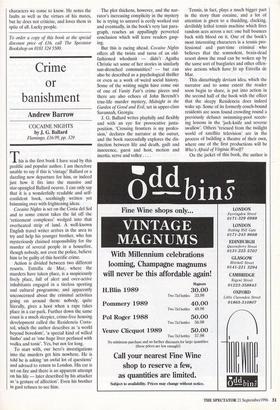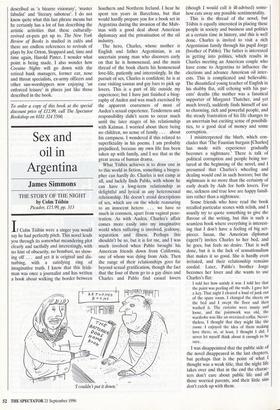Crime or banishment
Andrew Barrow
COCAINE NIGHTS by J. G. Ballard Flamingo, £16.99, pp. 329 This is the first book I have read by this prolific and popular author. I am therefore unable to say if this is 'vintage' Ballard or a dazzling new departure for him, or indeed just how it fits into the massive and star-spangled Ballard oeuvre. I can only say that it is a wonderfully readable and self- confident book, soothingly written yet brimming over with frightening ideas.
Cocaine Nights is set on the Costa del Sol and to some extent takes the lid off the 'retirement complexes' wedged into that overheated strip of land. A well-known English travel writer arrives in the area to try and help his younger brother, who has mysteriously claimed responsibility for the murder of several people in a housefire, though nobody, not even the police, believe him to be guilty of this horrific crime.
Action is divided between two different resorts. Estrella de Mar, where the murders have taken place, is a suspiciously lively place, full of alert and over-active inhabitants engaged in a tireless sporting and cultural programme, and apparently unconcerned about the criminal activities going on around them: nobody, quite literally, gives a hoot when a rape takes place in a car-park. Further down the same coast is a much sleepier, crime-free housing development called the Residencia Costa- sol, which the author describes as 'a world beyond boredom', 'a special kind of willed limbo' and as 'one huge liver perfused with vodka and tonic'. Yes, but not for long.
To start with, our hero's investigations into the murders get him nowhere. He is told he is asking 'an awful lot of questions' and advised to return to London. His car is set on fire and there is an apparent attempt on his life — later described by his attacker as 'a gesture of affection'. Even his brother in gaol refuses to see him. The plot thickens, however, and the nar- rator's increasing complicity in the mystery he is trying to unravel is eerily worked out and eventually, in the book's very last para- graph, reaches an appallingly perverted conclusion which will leave readers gasp- ing.
But this is racing ahead. Cocaine Nights offers all the twists and turns of an old- fashioned whodunit — didn't Agatha Christie set some of her stories in similarly sun-drenched communities? — but can also be described as a psychological thriller or even as a work of• weird social history. Some of the writing might have come out of one of Vanity Fair's crime pieces and there are also echoes of John Berendt's true-life murder mystery, Midnight in the Garden of Good and Evil, set in upper-class Savannah, Georgia.
J. G. Ballard writes playfully and flexibly and with an eye for provocative juxta- position. 'Crossing frontiers is my profes- sion,' declares the narrator at the outset, and the book successfully explores the dis- tinction between life and death, guilt and innocence, guest and host, motion and inertia, serve and volley ....
Tennis, in fact, plays a much bigger part in the story than cocaine, and a lot of attention is given to a thudding, clacking, devilishly lethal tennis machine which fires random aces across a net: one ball bounces back with blood on it. One of the book's most interesting characters is a tennis pro- fessional and part-time criminal who believes that the somnolent, brain-dead resort down the road can be waken up by the same sort of burglaries and other offen- sive actions which have .lit up Estrella de Mar.
This disturbingly deviant idea, which the narrator and to some extent the reader soon begin to share, is put into action in the second half of the book with the effect that the sleepy Residencia does indeed wake up. Some of its formerly couch-bound residents are soon found crowding round a previously defunct swimming-pool receiv- ing lessons in the lack-knife and reverse swallow'. Others 'rescued from the twilight world of satellite television' are in the process of building a theatre of their own, where one of the first productions will be Who's Afraid of Virginia Woolf?
On the jacket of this book, the author is described as 'a bizarre visionary', 'master fabulist' and 'literary saboteur'. I do not know quite what this last phrase means but he certainly has a lot of fun describing the artistic activities that these culturally- revived ex-pats get up to. The New York Review of Books is studied in cafes and there are endless references to revivals of plays by Joe Orton, Stoppsrd and, time and time again, Harold Pinter. I wonder what point is being made. I also wonder how Cocaine Nights will go down with the retired bank managers, former ear, nose and throat specialists, ex-army officers and other sun-worshippers now enjoying 'an enforced leisure' in places just like those described in the book.
To order a copy of this book at the special discount price of £12.99, call The Spectator Bookshop on 0181 324 5500.



















































































 Previous page
Previous page